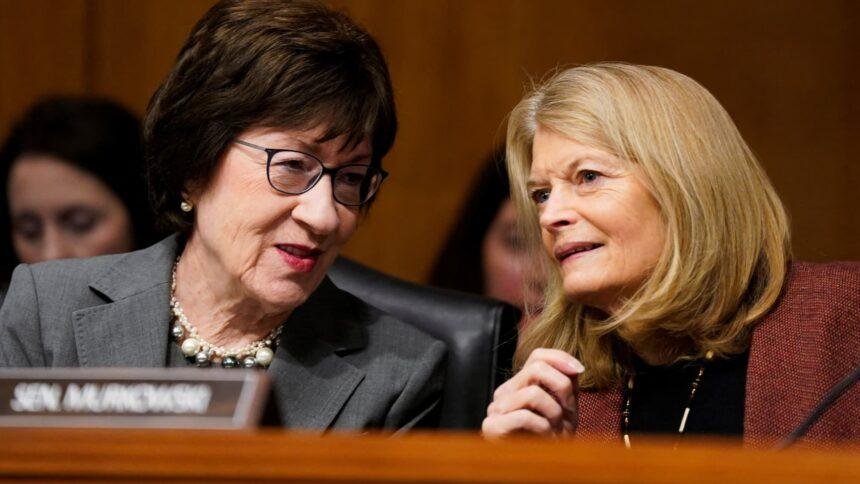Senator Collins Proposes Off-Ramp Amid Government Shutdown Stalemate
As the U.S. government faces a looming shutdown, Senator Susan Collins (R-ME) is actively seeking a compromise that could potentially break the deadlock. However, her approach has sparked a complex debate over healthcare funding, particularly concerning the Affordable Care Act (ACA) subsidies that are set to expire at the end of the year.
The Current Stalemate
The ongoing standoff in Washington has left many federal operations in limbo, with both parties entrenched in their positions. Collins has been circulating a “discussion draft” aimed at addressing the impasse, which includes Republican commitments related to enhanced tax credits under the ACA. According to reports from Punchbowl News, Collins is advocating for a two-step process: first, a funding resolution to reopen the government, followed by negotiations on the ACA subsidies.
Collins emphasized the need for a clear separation between the funding resolution and the more contentious healthcare discussions. “We should not have issues that are very complicated that split the Senate attached to the continuing resolution,” she stated, highlighting the urgency of resolving the shutdown without complicating factors.
The Healthcare Debate
The ACA subsidies, which provide financial assistance to millions of Americans, have become a focal point in the negotiations. Most Democratic senators have made it clear that they will not support any funding legislation unless it includes a commitment to extend these subsidies. This has created a significant barrier, as Republicans, including Collins, argue that discussions on healthcare should occur only after the government is reopened.
Collins has expressed her belief that while an extension of the ACA subsidies is necessary, it should be accompanied by reforms, such as income caps on eligibility. “I do think we need an extension, but we also need some reforms,” she noted, indicating a willingness to engage in a more comprehensive dialogue once the immediate crisis is resolved.
Bipartisan Dynamics
Collins and her colleague Senator Lisa Murkowski (R-AK) have a history of crossing party lines, often advocating for bipartisan solutions. Their moderate stances have positioned them as potential key players in the current negotiations. However, both senators have yet to indicate whether they will align with Democrats on the funding legislation, leaving the outcome uncertain.
The bipartisan nature of their approach is underscored by support from other Republicans, such as Senators Josh Hawley (R-MO) and Murkowski, as well as Representatives Jen Kiggans (R-VA) and Brian Fitzpatrick (R-PA), who also back the extension of the tax credits. This coalition suggests a growing recognition among some Republicans of the importance of addressing healthcare issues in the context of the funding debate.
Pressure from Independents
Adding to the complexity, Senator Angus King (I-ME), who caucuses with Democrats, has expressed frustration with the Republican stance on healthcare. King, who has previously voted with Republicans on funding bills, indicated that he may reconsider his support unless there is a more proactive approach to the ACA issue. “We need some assurance that they will deal with this problem, and so far that hasn’t been forthcoming,” he remarked, reflecting the increasing pressure on Republicans to engage with Democratic demands.
The Broader Implications
The current standoff is not just a political maneuver; it has real implications for millions of Americans who rely on government services and healthcare subsidies. The ACA, enacted in 2010, has been a cornerstone of healthcare reform, aimed at expanding access and affordability. The potential expiration of these subsidies could lead to significant disruptions in coverage for many individuals and families.
Senator Bernie Sanders (I-VT) has been vocal about the need for immediate action, warning that reopening the government without addressing healthcare concerns could undermine the leverage Democrats have in negotiations. “There has to be an agreement right now. That’s what this whole shutdown is about, to protect the American people and our healthcare system from collapsing,” he stated during a recent interview.
The Role of Leadership
Former President Donald Trump has also weighed in on the negotiations, claiming to be in discussions with Democrats that could lead to positive outcomes. However, Democratic leadership quickly refuted these claims, emphasizing that any commitments must be backed by concrete legislative action. This highlights the ongoing mistrust between the parties, complicating efforts to reach a consensus.
As the deadline for a government shutdown approaches, the stakes are high. Lawmakers are under increasing pressure to find a resolution that not only reopens the government but also addresses the critical healthcare needs of the American public. The outcome of these negotiations will likely set the tone for future bipartisan efforts and could have lasting implications for healthcare policy in the United States.
Conclusion
Senator Collins’ proposal represents a potential pathway out of the current government shutdown, but it is fraught with challenges. The intersection of funding and healthcare issues underscores the complexities of governance in a divided Congress. As discussions continue, the focus remains on finding a solution that balances the urgent need to reopen the government with the equally pressing need to secure healthcare for millions of Americans. The coming days will be crucial in determining whether a bipartisan compromise can be reached or if the stalemate will persist, further complicating the political landscape in Washington.











